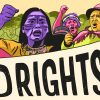Declaration: Stop Evictions in Guatemalan Communities
In these elections let’s vote for the right to land and agrarian justice.
The rural and Indigenous agenda is absent from the political electoral debate. As civil society and Indigenous and peasant organizations we demand that the candidates prioritize solutions to agrarian conflict in their government plans in country. This is necessary for the communities who live from the land to achieve justice and land security.
The 2023 elections have been stained by the arbitrary suspension of candidates, which reflects the deterioration of our already fragile electoral democracy and has called into question the independence of electoral institutions. In the face of this we would like to warn the public about the danger of continuity of establishment political and economic powers to land rights in Guatemala.
The disregard of the current government platform for rural and Indigenous communities is outrageous.
The forced evictions of communities have continued even in the electoral context, despite the fact that they are prohibited by international standards during elections. In 2022 alone, more than 70 cases of evictions were reported, with the highest incidence of evictions in the departments of Alta Verapaz, Baja Verapaz, Izabal, Quiché, Petén, Escuintla and Santa Rosa.
The rates of poverty, inequality, and repression in the countryside have worsened; reflecting the permanent state of the land insecurity and aggressions faced by Indigenous and rural communities in their territories. According to official data, in 2019 around 165,000 families lived in extreme poverty due to a complete lack of land. This has driven migration and abandonment of the countryside. Instead of seeking sustainable solutions to this situation, the State has responded by eliminating the agrarian institution in charge of investigating and dialoguing to find peaceful solutions. They have even acted with excessive force in cases of eviction. The State now lacks a mechanism for ensuring land access for the Guatemalan people, and fails to respond to the needs of the landless peasant population.
At the same time, the budget for peasant family agriculture has been cut, directly impacting more than one million rural households, which provide more than 70% of food consumed nationally. Leaders of rural and Indigenous communities and civil society organizations demand:
- An immediate halt to the evictions of and the use of violence against landless rural and Indigenous families. It is urgent to establish a national dialogue and search for solutions within the framework of the conventions and declaration on the rights of peasant and Indigenous peoples, in particular the United Nations International Standards on Human Rights and Prevention of Forced Evictions.
- The cessation of aggressions of extractive megaprojects and large businesses in Indigenous territories and respect for the authority of community organizations.
- Prompt and effective justice for the individuals and communities criminalized for defending human rights.
- The reincorporation of the Agreement on Socioeconomic Matters and Agrarian Situations to guide public policy and guide the execution of a rural development policy as established in the Peace Accords.
We urge the Guatemalan population to reject with their vote political parties and actors linked to corruption, impunity, and human rights violations. Let us elect leaders committed to the integrity of rural development, the economic and political recognition of women, the protection of natural resources, and the representation of Indigenous peoples within the State.
There can be no democracy without the rights of land and justice for communities.




